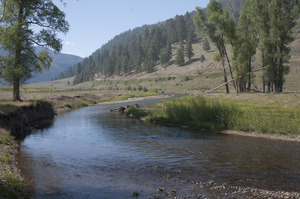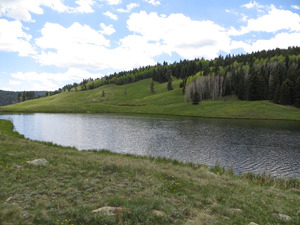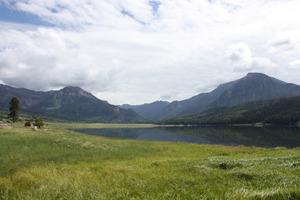The WPJ
THE WORLD PROPERTY JOURNALReal Estate Facts Not Fiction
Commercial Real Estate News

Famed Investor Backs Fund Focused on Ranches
Commercial News » North America Commercial News Edition | By Kevin Brass | July 15, 2013 8:00 AM ET
Legendary financier and corporate raider T. Boone Pickens is one of the initial investors in a fund looking to profit from converting swatches of pristine Western wilderness into sports ranches for hunting and fishing.
In the last year Sporting Ranch Capital has used its initial $30 million fund to buy four ranches in New Mexico, Colorado, Idaho and Utah, and is negotiating for two more.
"This is a big boy asset class," said founder Jay Ellis, in an interview with World Property Channel.
The fund wants to create a "new end-market" for sports ranches. Mr. Ellis targets properties priced between $2 million and $8 million with postcard locations and "live water." He typically wants to spend about $250,000 or less to add services to the property and enhance the fish and wildlife habitats, and then flip the land as a sports ranch.
"We buy at agricultural value and sell for recreational value and there is a significant difference," said Mr. Ellis, who spent 25 years with Credit Suisse First Boston and Morgan Stanley before launching the fund.
The fund also looks to take advantage of state and federal incentive programs for conserving and protecting land. And, as an extra benefit, investors are allowed to hunt and fish on the property while it is prepared for the market.
The key: Finding the right property at the right price, which is not easy, says Mr. Ellis, who is based in Dallas.
"These are finite assets in diminishing supply," he said. "There is never an inventory glut."
 Mr. Ellis searches for property off market, before the land has been listed by one of the numerous brokers handling this type of property. (See Hall & Hall.) Once the properties are publically listed expenses soar, Mr. Ellis says.
Mr. Ellis searches for property off market, before the land has been listed by one of the numerous brokers handling this type of property. (See Hall & Hall.) Once the properties are publically listed expenses soar, Mr. Ellis says.Instead Mr. Ellis actively searches the back trails and mountain roads of the west, hoping for tips on available property, primarily from land trusts and community banks. "Our objectives are aligned with a lot of the land trusts," Mr. Ellis said.
Finding properties in the $2 million to $8 million price range is essential, Mr. Ellis said. "When you hit $10 million you've eliminated 98 percent of the buying pool."
The fund is very specific about the requirements for properties. Mr. Ellis is only interested in land within a 40-minute drive of basic amenities, including an airport. He doesn't want unreachable wilderness property, but the land must offer the type of dramatic landscapes necessary to entice elite clients.
 "We want the 'wow factor,'" Mr. Ellis said.
"We want the 'wow factor,'" Mr. Ellis said.The property must also be ready for an upgrade. Maybe the land has access issues, a lack of utilities or other basic services, which can be added with a minimal investment. They are not looking to develop properties with homes or hotels; they won't build structures, but they will renovate existing structures. For example, on one ranch a 100-year-old sheepherder's cabin was converted into a cantina with a pool table and a big screen TV.
The fund avoids property that is encumbered by conservation standards or strict land-use restrictions. The goal is to maintain wilderness areas, but not at the cost of resale value.
Land-use restrictions are one variable making it difficult to accurately evaluate the value of these types of properties, one of the many landmines facing ranch investors. They rarely sell and there is a finite audience of potential buyers, Jim Taylor, a partner in Hall & Hall recently told the Wall Street Journal.
Mr. Ellis is already finding it more difficult to find properties that fit the fund's criteria. With the economy improving, owners are more reluctant to sell.
"We don't chase anything," Mr. Ellis said. "You have got to buy these places right."
 For now the fund is biding its time, although plans for a second $50 million fund are already in development. "We're not in a rush," Mr. Ellis said. We know what we want to buy."
For now the fund is biding its time, although plans for a second $50 million fund are already in development. "We're not in a rush," Mr. Ellis said. We know what we want to buy."The fund is about to test the resell market for the first time with a 518-acre ranch in New Mexico. (Mr. Ellis declined to discuss the price.) After buying the property, the fund installed a skeet range, enhanced and stocked a stream, and developed the elk and deer habitats, as well as a bird preserve.
Mr. Ellis acknowledges he is not sure what to expect in the sales market. Ranches are notoriously easier to buy than sell. But he is confident they will find buyers.
"This is the most inefficient property asset class," Mr. Ellis said. "Purchases are emotional."
Sign Up Free | The WPJ Weekly Newsletter
Relevant real estate news.
Actionable market intelligence.
Right to your inbox every week.
Real Estate Listings Showcase
Related News Stories
Commercial Real Estate Headlines
- 2025 Prediction: U.S. Commercial Investment Recovery Expected to Gain Traction
- Holiday Retail Sales for 2024 to Hit Record $1 Trillion
- Tech, AI Industries Drive Largest Share of Office Leasing Activity in U.S.
- Commercial Real Estate Lending in U.S. Enjoys Strong Growth in Q3
- U.S. Multifamily Market Begins Recovery in Q3
- Commercial Investment in Japan Spikes 24 Percent Annually in Q3
- Despite Return-to-Office Mandates, U.S. Office Vacancies Continue to Rise
- PROPSIG Tech Startup Acquired by World Property Data
- U.S. Commercial Mortgage Debt Hits $4.7 Trillion in Q2 as Delinquencies Increase
- Hong Kong Class A Office Rents Continue to Downtick in Mid-Summer
- U.S. Office Landlords Tenant Concessions Decline for First Time in 4 Years
- U.S. Commercial Mortgage Originations Spike 27 Percent in Q2 Over Q1
- Phnom Penh's Commercial Office, Retail Markets Face Slowdowns in 2024
- Global Edge Data Center Market to Hit $300 Billion by 2026
- Commercial Property Transactions in Japan Dive 25 Percent Annually in Q2
- Delinquency Rates for U.S. Commercial Property Loans Downticks in Q2
- Megawarehouse Lease Deals in U.S. Increase in 2024
- Office Tenants' Flight to Quality Buildings Increases in 2024
- Commercial Lending in Japan Upticks 6 Percent Annually in Q1
- AI Driving Significant Global Data Center Growth in 2024
- Total U.S. Commercial Mortgage Debt Rises to $4.7 Trillion in Q1
- U.S. Commercial Mortgage Delinquencies Rise in Early 2024
- Asia Pacific Office Sector to Further Reprice Throughout 2024
- U.S. Retail Foot Traffic to Surpass Pre-Pandemic Levels by 2025
- Commercial Real Estate Lending in U.S. Slowed in First Quarter
- Japan Commercial Property Investment Volume Jumps 7 Percent in Q1
- Asia Pacific Commercial Property Investment Leads the World, Spikes 13 Percent
- Driven by High Rates, U.S. Commercial Lending Imploded 47 Percent in 2023
- After Two Year Slump, Prime Multifamily Metrics Uptick in U.S.
- Commercial Co-Broker Commissions Not Affected by NAR-DOJ Settlement, Yet
- U.S. Office Buildings with Upscale Tenant Amenities Still Enjoy Premium Rents in 2024
- U.S. Commercial, Multifamily Mortgage Delinquency Rates Uptick in Q4
- U.S. Commercial Mortgage Debt Continued to Rise in 2023, Hits $4.7 Trillion
- Nonresidential Construction Spending in the U.S. Falls Sharply in January
- U.S. Multifamily Construction Starts to Decline in 2024
- Commercial Mortgage Lending in U.S. Shows Signs of Stabilization in Late 2023
- Architecture Billings Decline in December as Soft Business Conditions Persist
- Government Sector Claimed Largest Portion of 100 Biggest U.S. Office Leases Signed in 2023
- U.S. Commercial, Multifamily Borrowing Dives 25 Percent Annually in Late 2023
- Record High Multifamily Construction Deliveries Drive Vacancy Rates Higher
Reader Poll
Marketplace Links
This website uses cookies to improve user experience. By using our website you consent in accordance with our Cookie Policy. Read More





